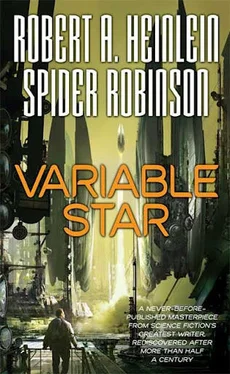But if so, what of Sol, in the stair-shaft?
Sure enough, the Sheffield was later able to tell me that it was less than a second after Sol stablilized in his new position that weight suddenly returned—followed a split second later by the siren blast that was supposed to give ten seconds’ warning before any vector change. At once he began slapping at passing rungs to kill velocity, and looking below for his landing site. In the end, he landed with nothing worse than a sprained ankle, which became severely sprained after he ran on it.
By the time he landed, that was important. Crucial, even. Because by then George R was dead, and London was… was permanently out of action.
The Sheffield was down two Relativists, now… and that left us exactly enough to keep the quantum ramjet running twenty-four hours a day. There was going to be no acceptable excuse to miss a shift… for the next fifteen years.
What happened in the Power Room that day?
There’s a lengthy report on file, which I am assured is accurate and complete; you’re welcome to look it up. It’s full of what look like words, arranged in sequences that seem to be sentences, and the one I come closest to understanding seems to say that the Zero Point became briefly numerable, and George R was unable to deny it. Maybe that conveys something to you; it’s noise to me.
Months later, at various times, I heard Dugald Beader say that George R had “stopped surrendering,” and heard a massively drunken Kindred assert that his colleague had “lost his focus.” How those two things could describe the same event, I cannot imagine.
Here’s what little I do understand.
First of all, George R was not supposed to be on duty that shift. Hideo was. That was why Sol lost it. But at the last minute, one of Hideo’s Zen students had come to him with a spiritual crisis, and he’d asked to be replaced.
This was no big deal. By that point in the voyage, all of the Relativists had missed a shift or two; it was part of what spares were for. Hideo had probably missed fewer than anyone else but Kindred—and had extracurricular responsibilities the others lacked. If anyone was entitled to blow off a shift, it was him.
The person he was supposed to succeed was George R. When his request showed up on George R’s board, George R should have messaged backup, confirmed availability, then let Hideo know he was off the hook—a total of three keystrokes. He did only the third.
Who can say what was in his mind? Of the Relativists aboard, Sol was the loudest, and Peter Kindred the most egotistical, but George R was far and away the most sheerly confident . There was no leader, but he was senior among equals. The backup he should have called was London. She was asleep just then, in their quarters. Perhaps he just wanted to do something nice for his wife. Maybe it was a gesture of apology to get him out of some marital doghouse. It may simply have been easier for a man as confident as him to push one key than three.
He certainly was not the first Relativist ever to work a double shift. But I think it’s safe to say he was the last.
Fatigue? Monotony? Bad judgment? Bad luck? None of them ever said, and none of us ever had the balls to ask.
Something Horrible happened in there, that’s all.
Whatever it was took something like thirty seconds to finish burning his brains out, and matters should have ended there. It is certain that he did not at any time trigger an alarm or send out a message of any kind. The ramjet should have failed, and then whoever won the race to the Power Room should have yanked his smoking body out of the way and, hopeably, restarted it.
I do not know how London got there before he finished dying. She knew exactly how dangerous it was to try and go in there, just then, and never hesitated. Whether she believed she could save him or simply didn’t care to outlive him is not for me or anyone to say. If it was a mistake in judgment she paid dearly enough for it—with her eyesight, most of her hearing, and about eighty-five IQ points.
A rain of shit can take time to stop. It was doubtless lucky for all of us that Hideo was the next to reach the Power Room. Of all of them he most had the kind of iron discipline and diamond calm it must take to toss the smoldering bodies of two friends out in the corridor for others to deal with, forget them, and try to restart a quantum ramjet. I honestly think any of them could have done it, but I’m glad it was Hideo who got the job.
But when he emerged, and had been thanked in turn by Captain Bean, Governor Roberts, Governor-General Cott, and Coordinator Grossman, Sol and Dr. Amy had to take him aside and tell him that the student he’d blown off his original shift to counsel had pieced events together, and committed suicide from guilt.
A poor reward for heroism.
During this period, Tesla spoke out vehemently against the new theories of Albert Einstein, insisting that energy is not contained in matter, but in the space between the particles of an atom.
—
Tesla, Master of Lightning PBS-TV documentary, Dec. 12, 2000
The next few weeks were dark.
Disaster on that scale can demoralize a community—or draw it together. The crucial factor seems to be, how fast does the fear ease?
It was touch and go. Dr. Amy and her three other Healers had their work cut out for them. Coordinator Grossman and the Zog, Governor Roberts, Governor-General Cott and his partner, Chief Engineer Cunningham, even Captain Bean himself, all made a point of wandering around the ship with cheerful optimistic expressions fixed on their faces. It did help, a little. But only a little.
How do you tell someone falling through the universe at nearly the speed of a photon there’s nothing to worry about? When the most valued, pampered members of the ship’s company can die and worse than die, who is safe? I don’t think any of us had really expected any dying to begin until we got to Bravo. Now all our lives and plans and hopes depended on four particular people remaining not only alive but healthy enough to work for every day of the next fifteen years.
And that was the heart of our darkness: theirs.
Thanks for coming in ahead of schedule, Joel,” said Dr. Amy.
“No problem,” I said, settling into my chair. “To tell you the truth, though, things haven’t been too bad lately.”
“I’m glad to hear that,” she said.
“I mean, I know you must have your hands full—”
“That’s what I want to talk to you about, this time.”
“Crave pardon?”
“I’m going to be more blunt and candid with you than I have been with the rest of the colony, Joel.”
Yikes. “Okay.”
“This ship is in trouble.”
I nodded. “I know.”
“The morale crisis is not responding to anything we can do. I think you know why.”
I nodded again. “The Relativists. The rest of us… colonists, administrators like you, crew… none of us can begin to heal until they do.” All four stalked the corridors like golems, now, and were given as wide a berth by all they passed. All four had politely declined to speak to a Healer, as was their right. They didn’t even seem to crave each other’s company. They spoke as little as possible at shift change, and less at any other time.
Her turn to nod. “They do their duty. They keep the engine running. But that’s the absolute limit of their strength right now. They’re the heart of the ship. And they’re heartsick.”
“I have to say I can’t blame them a bit,” I said. “One of the best of them died, another wasn’t as lucky—and it could happen to any one of the rest at any time. It can’t be easy healing if every day you have to spend six straight hours utterly devoid of all emotions… in the presence of the force you most fear and hate. I’m amazed they can function at all.”
Читать дальше










